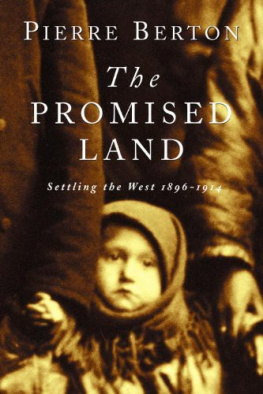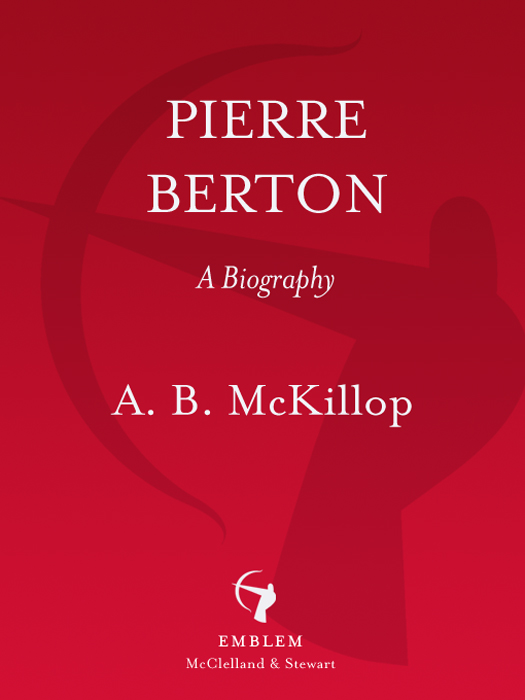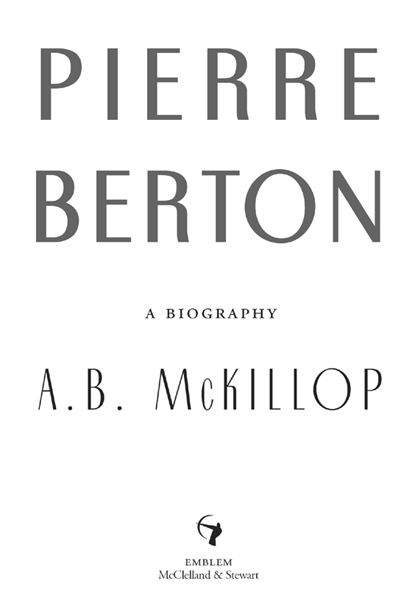Copyright 2008 A.B. McKillop
Cloth edition published 2008
Emblem edition published 2010
Emblem is an imprint of McClelland & Stewart Ltd.
Emblem and colophon are registered trademarks of McClelland & Stewart Ltd.
All rights reserved. The use of any part of this publication reproduced, transmitted in any form or by any means, electronic, mechanical, photocopying, recording, or otherwise, or stored in a retrieval system, without the prior written consent of the publisher or, in case of photocopying or other reprographic copying, a licence from the Canadian Copyright Licensing Agency is an infringement of the copyright law.
Library and Archives Canada Cataloguing in Publication
McKillop, A. B., 1946
Pierre Berton : a biography / A.B. McKillop.
eISBN: 978-1-55199-622-6
1. Berton, Pierre, 19202004. 2. Historians Canada Biography. 3. Journalists Canada
Biography. 4. Authors, Canadian (English) 20th century Biography.
I. Title.
FC151.B48M34 2010 971.007202 C2010-901494-4
We acknowledge the financial support of the Government of Canada through the Book Publishing Industry Development Program and that of the Government of Ontario through the Ontario Media Development Corporations Ontario Book Initiative. We further acknowledge the support of the Canada Council for the Arts and the Ontario Arts Council for our publishing program.
Published simultaneously in the United States of America by
McClelland & Stewart Ltd., P.O. Box 1030, Plattsburgh, New York 12901
Library of Congress Control Number: 2010927464
McClelland & Stewart Ltd.
75 Sherbourne Street
Toronto, Ontario
M5A 2P9
www.mcclelland.com
v3.1
To
George James McKillop
(19212008)
whose Chilkoot was the Second World War
In Memoriam
I had what I can only call an intuition that there was in the soul of that boy some confused striving, whether of half-thought-out ideas or of dimly felt emotions I could not tell, which filled him with a restlessness that urged him he did not know whither.
Somerset Maugham, The Razors Edge (1944)
If you want me youll have to take me as I am instead of trying to turn me into some lah de dah with a cane! Im no stuffed shirt writing peanut ads. God damn it Im a newspaper man.
Ben Hecht and Charles MacArthur, The Front Page (1928)
In a story you had only to wish, you had only to write it down and you could have the world.
Ian McEwan, Atonement (2001)
CONTENTS

PREFACE

In the summer of 1961, freshly graduated from grade nine at Winnipegs Cecil Rhodes School, I selected a book to take along on a family fishing trip, thanks to the advice of Mr. Alward, my history teacher. That book was Pierre Bertons Klondike, and it was the first work of history I encountered that was shelved in the adult section of the Winnipeg Public Library main branch. The name of the author meant nothing to me, but after reading that book on Lake Rozena near the Lake of the Woods (no fisherman, I), I knew that Canadian history was certainly not dull.
Bertons life intersected with my own in several ways, although I did not know this at the time. At home in Winnipeg, each Monday I delivered the Star Weekly magazine, utterly unaware that in the very weeks and months I did so, Berton was writing the most popular and influential column in Canadian newspaper history for its host newspaper, the Toronto Star. (For that matter, I was unaware of the existence of the Toronto Star itself: in those days, I believed that Don Mills, a name often encountered on cereal boxes, was so important that the post office did not require him to provide a street address: it was enough to write Don Mills, Ontario.) A lengthy profile of Berton that appeared in the pages of the Star Weekly in 1959, What Makes Pierre Tear? failed to register on me, if I read it at all. At home, like so many other Canadians, my family and I settled in front of the television with a devotion not afforded to the United Church behind our house and watched Front Page Challenge, the quiz program featuring a glamorous panel that included a man in a bow tie; it seemed to be he who had the most fun identifying the hidden guests and the stories they represented.
A decade later, I entered a doctoral program at university to train as a Canadian historian, just as Berton captured the stern gaze of my professors by encroaching on their territory with the first volume of his history of Canadas first transcontinental railway. I defended my M.A. thesis, a narrative history of civic politics in interwar Winnipeg, within days of the release of this book, The National Dream, in the fall of 1970, and was puzzled when the external examiner began the questioning with the query, What is history, Brian? I was too stricken, or perhaps simply too gormless, to recognize at the time that Tom Peterson, the gentlest of political scientists, wanted me to ask myself a simple question: Is history a story to be told or a problem to be solved? This tension was soon to become central to Bertons relationship with the academic community. It helped shape my attitude toward the discipline that became my profession and affected my practice of it.
During Pierre Bertons final years, it struck me that when he eventually died, he risked being remembered primarily for his contributions to Canadian history: as Mr. Canada, the popular historian. Certainly the phase of his career taken up by writing history was important. For more than thirty years he had been in the public eye as the premier chronicler of Canadian history. But measured against the backdrop of his times, his life was of much greater canvas and significance than this. In my judgment, the most important and revealing years of his life were those between his arrival in Toronto in 1947 and his publication of The National Dream in 1970. These twenty-three years witnessed his rise to eminence and the transformation of his reputation from that of a coming author and local celebrity to a controversial national figure known to virtually every Canadian. Berton began to make his name when the very idea of a Canadian celebrity was repugnant to the arbiters of cultural standards. He established his reputation during the decades when an American-inspired culture of celebrity swept over popular taste, and he rode that wave, sometimes against the current, until his name held the status of a cultural brand. He accomplished this not simply through his omnipresence in the media, but because during these years the causes he supported and the values he held dear and defended came to be associated closely with the aspirations, the desires and fears, and the social values of his fellow Canadians. Mary Pickford, Stephen Leacock, and Mackenzie King had been well known, but Pierre Berton became Canadas first modern celebrity and eventually its most celebrated native son and iconic figure.
Cultural historians sometimes employ the term cultural moment as a way of isolating a period of time a day, year, or decade that is marked by a flurry of artistic activity so intense that it helps define and lends coherence and consequence to an idea or a movement. A moment in this sense is as much connected to the Greek word







